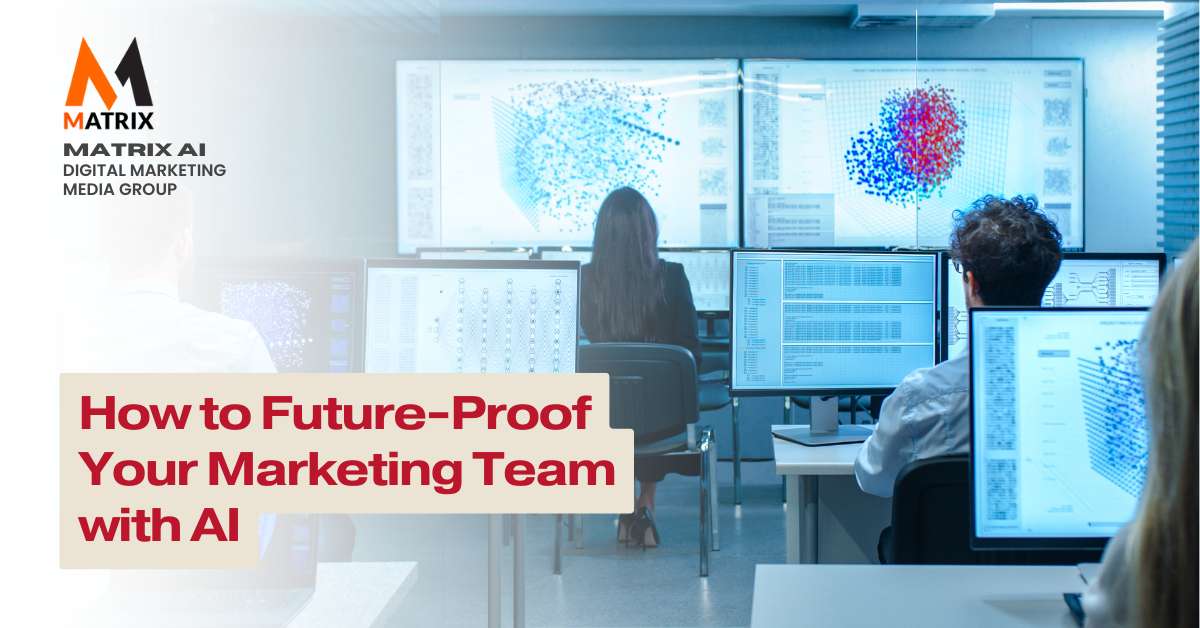Future-Proofing Your Marketing Team with AI
For the past decade, businesses have undergone a digital transformation while laggers are still trying to figure it out. With today’s technology, AI is no tool. It’s not Photoshop, Word, or a writer. Can it do all that, sure? That’s hygiene.
AI has disrupted the normal pattern of behavior and business models. So, if you were one of the laggers, it’s not too late to revolutionize your business. AI is a system that, when implemented correctly, future-proofs your business model.
Embrace the AI Revolution
In today’s rapidly evolving digital landscape, artificial intelligence (AI) is no longer a futuristic concept but a present-day reality transforming industries.
As a brand manager, staying ahead of the curve means leveraging AI to future-proof your marketing team. But how can AI enhance your marketing efforts and ensure long-term success?
The Power of Precision and Personalization
Imagine a world where your marketing campaigns are data-driven and intelligently automated to deliver precision and personalization like never before. It’s back to the 1960s marketing.
AI can sift through massive datasets to identify patterns, predict trends, and provide actionable insights, allowing you to make more informed decisions. It’s like having a team of data scientists working around the clock, bringing unprecedented accuracy to your marketing strategies.
Efficiency Redefined
AI can transform time-consuming tasks such as customer segmentation, content creation, and performance analysis.
By automating these processes, your team can focus on what truly matters: creative strategizing and building meaningful customer relationships. Efficiency is no longer a buzzword—it’s a tangible benefit that AI offers, enabling your team to work smarter, not harder.
Are You Ready for the Future?
Are you prepared to embrace AI and transform your marketing team? This guide will help you discover how AI can revolutionize your marketing efforts, enhance customer experiences, and drive growth.
From understanding the basics of AI technologies to implementing them in your daily operations, this journey will equip you with the tools and knowledge needed to thrive in an AI-driven future. Get ready to unlock AI’s potential and lead your marketing team into a new era of innovation and success.
Unlocking Potential: The Pains and Needs of CMO with lack of AI experience

The Frustration of Ineffective Strategies
CMOs frequently feel frustrated when their strategies, based on their lack of AI experience, do not yield the expected outcomes.
Despite significant investment in time, resources, and effort, the results often need to catch up, leading to wasted opportunities and strained budgets.
This misalignment between goals and actual results can erode confidence and create pressure to demonstrate success, making it a major pain point for CMO.
The Need for Detailed Insight and Clarity
At the core of addressing a lack of AI experience, the CMO needs detailed insight and clarity. They seek comprehensive data and analytics to understand underlying issues and identify opportunities for improvement.
Precise metrics, user feedback, and performance indicators are crucial for making informed decisions. This clarity helps CMOs optimize their strategies, ensuring that every effort is geared toward achieving tangible results.
Navigating Technological Hurdles
Navigating the technological hurdles associated with a lack of AI experience is a significant pain point for CMOs. Outdated systems, lack of integration, and insufficient technical expertise can impede progress.
Keeping up with rapid technological advancements is challenging and requires continuous learning and adaptation. [Audiences] need reliable, user-friendly tools and platforms that seamlessly integrate into existing workflows, reducing complexity and enhancing efficiency.
The Aspiration for Innovation and Growth
CMO continuously aspires to drive innovation and growth through its approach to the lack of AI experience. It aims to adopt cutting-edge technologies, implement best practices, and explore creative solutions to stay ahead of the competition.
This aspiration involves fostering a culture of ongoing learning, experimentation, and agility. The drive for innovation enhances performance and ensures the CMO can effectively respond to evolving market demands and opportunities.
While your audience grapples with the frustration of ineffective strategies and technological hurdles related to poor results, their needs center around gaining detailed insights and driving innovation; these challenges and aspirations drive their continuous efforts to refine their approaches, optimize performance, and achieve sustained success.
Harnessing AI to Boost Search Rankings

Staying ahead of the curve is paramount for marketing success in the evolving digital landscape.
Artificial Intelligence (AI) offers many opportunities to future-proof your marketing team, especially in improving search rankings.
Here, we delve into three specific examples of how AI can enhance your SEO strategy, sparking curiosity and engaging brand managers with actionable insights.
Example 1: AI-Powered Keyword Optimization
The Challenge
A mid-sized retail brand struggled to maintain its search engine rankings due to suboptimal keyword strategies. Traditional keyword research methods were time-consuming and often missed emerging trends, resulting in missed opportunities and lower organic traffic.
Action Plan
By integrating AI-powered tools like SEMrush, Moz, or Ahrefs, the brand manager was able to automate and enhance keyword research.
These AI tools analyze vast amounts of data to identify high-impact keywords, long-tail variations, and emerging trends. Furthermore, they provide insights into keyword difficulty and search volume, enabling the creation of targeted content strategies.
Machine learning algorithms continuously update and refine keyword recommendations based on real-time search engine data.
The Benefits
Implementing AI-powered keyword optimization led to a substantial improvement in search rankings for the retail brand. Using precise, data-driven keywords resulted in higher visibility and increased organic traffic.
The automated process also freed up valuable time for the marketing team, allowing them to focus on creative and strategic initiatives. This approach highlighted the critical role of AI in refining keyword strategies and driving SEO performance.
Example 2: Enhancing Content Creation with AI

The Challenge
A B2B software company needed help producing high-quality, SEO-optimized content at scale. The manual content creation process could have been more time-consuming and consistent regarding SEO best practices, affecting their search rankings.
The Action Plan
The brand manager used AI-driven content creation tools like Copy.ai, Jasper, and Grammarly. These tools leverage natural language processing (NLP) to generate and optimize content that aligns with SEO guidelines.
AI algorithms suggest relevant keywords, optimize meta descriptions, and ensure proper keyword density and placement. Additionally, AI tools can analyze competitor content to identify gaps and opportunities for differentiation.
The Benefits
The use of AI in content creation resulted in a noticeable increase in search rankings and organic traffic for the B2B software company. AI-generated content was SEO-optimized and engaging and relevant to their target audience.
This led to improved user experience, longer dwell times, and higher engagement metrics, contributing to better search engine rankings. This example underscores the transformative impact of AI on content strategy and SEO performance.
Example 3: AI-Driven Technical SEO Audits
The Challenge
A travel agency’s website was plagued with technical SEO issues hindering its search engine performance. Manual audits did not identify and resolve all the issues, resulting in subpar rankings and lost traffic opportunities.
The Action Plan
The brand manager implemented AI-driven SEO audit tools like DeepCrawl, Botify, and Screaming Frog.
These tools use machine learning algorithms to conduct comprehensive technical SEO audits, identifying broken links, duplicate content, slow page load speeds, and mobile-friendliness.
The AI tools provided actionable insights and prioritized recommendations to fix the identified issues efficiently.
The Benefits
The AI-driven technical SEO audits significantly improved the travel agency’s search rankings. Resolving technical issues promptly improved the website’s performance and user experience, resulting in higher search engine rankings.
The automated audits also ensured ongoing site health, allowing the marketing team to address issues before they impacted search performance proactively.
This example highlights the importance of AI in maintaining technical SEO excellence and achieving sustained SEO success.
Future-Proofing SEO with AI
AI is a futuristic and practical tool that can significantly enhance your search rankings today.
By leveraging AI-powered keyword optimization, content creation, and technical SEO audits, brand managers can drive higher organic traffic, improve user experience, and stay ahead of the competition.
Are you ready to future-proof your marketing team with AI and elevate your SEO strategy? Embrace these innovative tools and watch your search rankings soar in the competitive digital landscape.
Key Industry Benchmarks
Industry benchmarks underscore the transformative impact of AI in marketing. According to a Salesforce survey, 84% of marketers reported using AI in 2020, up from just 29% in 2018.
Furthermore, McKinsey & Company found that companies integrating AI into their marketing and sales functions have seen an average revenue increase of 10-20%.
These benchmarks highlight AI’s rapid adoption and significant benefits, making it a critical component of modern marketing strategies.
Key Benefits
The key benefits of incorporating AI into your marketing team are multifaceted.
- First, enhanced efficiency is achieved through AI-powered automation tools that handle repetitive tasks, freeing your team to focus on strategic initiatives. This includes AI-driven keyword optimization, content creation, and technical SEO audits that streamline processes and improve outcomes.
- Second, improved accuracy results from data-driven insights and predictive analytics, enabling more precise targeting, personalized marketing, and better decision-making.
- Third, increased innovation stems from AI’s ability to generate creative content, identify emerging trends, and optimize real-time campaigns, keeping your brand ahead of the curve.
Conclusion: Future-Proof Your Marketing Team with AI
In the ever-evolving digital landscape, leveraging Artificial Intelligence (AI) is no longer optional but necessary to stay competitive.
As a brand manager, integrating AI into your marketing strategies can significantly enhance your team’s efficiency, creativity, and effectiveness, ensuring that your brand survives and thrives in the future.
Are you ready to future-proof your marketing team and harness AI’s full potential? Integrating AI tools and strategies can drive higher search rankings, enhance user engagement, and achieve sustained growth.
Embrace these advancements to transform your marketing efforts, ensuring your brand remains competitive in the dynamic digital landscape.
It’s time to unlock the power of AI and lead your marketing team into a future of unparalleled success. Let these insights guide you in making informed, strategic decisions that propel your brand forward.


